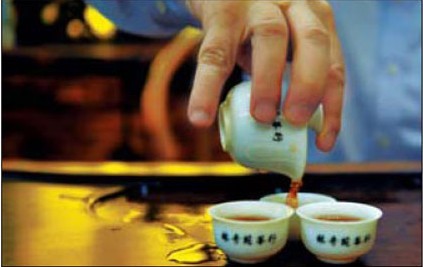| Home > Living In China |
Cultural Thirst Drives China's Top Tea Boom

"It's like magic," managing director Sam Lam says, as he prepared tea according to the Chinese ritual, pouring boiling water through rough leaves and then into tiny cups to drink and spoke of the profits to be made.
The brew is of pu'er, a dark tea fermented after drying and whose taste mellows with age. Its history is thought to date back between 1,000 and 2,000 years, with legends of growers in mountainous Yunnan province ferociously guarding their cultivation secrets.
Over the past 20 years, prices for aged pu'er have rocketed, while China has encouraged renewed development of a luxury tea culture which parallels that of wine - partly as a source of national pride in a homegrown high-end product.
With more than 70,000 tea businesses on the Chinese mainland, skilled buyers must taste tea in order to assess its quality, which only increases pu'er's mystique and sociability.
"You can tell from the aftertaste, the smoothness," Lam says, pouring out cups with practiced hands.
The tea is sold in pressed round "cakes", wrapped in paper printed with bold designs that reflect the vintage of each one.
Lam's father set up the business, Lam Kie Yuen, after moving to Hong Kong from the war-torn mainland in 1949.
But the pair says it is only since the mid-1990s that the market for luxury pu'er - also, in its less refined forms, a staple of cheap restaurants - has exploded, with middle-class investors joining the wealthy to buy it up.
The Lams are now selling tea from the 1930 to 1950 era for up to HK$200,000 (more than $25,000) per 345-gram cake, having bought much of it in cheap truckloads from dim sum restaurants that closed down.
"Growth slowed during the economic downturn, but it's still ongoing," Sam Lam says.
"As the price is rising, people are buying it less to drink and more to collect and invest."
But luxury pu'er is not just bought to set aside. It is identified with proud, ancient aspects of Chinese culture, in contrast with the cheap "made-in-China" goods that have spurred the country's economic rise.
In Hong Kong's hectic Mong Kok district, fashionably dressed young men gather at a quiet teahouse for lessons from qualified tea master Eliza Liu.
"It's like a drug - I'm addicted now," 21-year-old student Ngan Kan Shing says.
"By discovering tea, I feel that I've learned about China."
He has been coming to classes for six years, but says, "I still only know the basics."
The group examines the color of each brew before sniffing and then slurping it in respectful silence, as Liu talks them through the value of the aged tea.
Grown before artificial pesticides and dried naturally rather than at a high temperature, it has a paler color and a smoother taste.
"Good tea is produced at higher altitude and also depends on climate," Liu says.
"In Yunnan, they say a tea tree can experience all four seasons in one day."
The tea is served from small fine china tea sets, used with a tray that drains off excess water. The first cup of each brew is not drunk, as it is used to clean dust or residue from the leaves. After that, a good tea should taste different with every cup, say experts.
Liu and tea professor Yip Man, who taught her the art, are skeptical of the eye-popping prices paid for some teas, preferring to emphasis tea's longtime role in Chinese medicine and thought.
"Tea has a philosophy behind it, and it's about health," Yip says.
"Tea has been very commercialized, but a cheaper tea may also be as good (as an expensive one). The philosophy is about harmony, bringing people together, peace within the self."
Custom
 more
moreWeb Dictionary
University
Zhuhai College of Jilin University
Huaibei Normal University
Beijing Information Science and Technology Unive...
Primary&secondary
Beijing No.9 Middle School
Wanjie zhaoyang School
The High School Affiliated to Renmin University ...
Language school
Beijing International Chinese College
Provide more comprehensive, professional and convenient services for...
Northeast Yucai Education Group
A public school providing primary education ranging from grade one o...
Guangdong Overseas Chinese Vocational School
The Chinese Educational Base, a foreign-oriented public institution....
Hobby School
Shaolin Temple South-and-North martial arts coll...
Established and developed by thirty-four generations of martial arts...
China Times
Its main undertakings include TCFL Training, TCFL Teacher Internatio...
Chopsticks Cooking Centre
Subjects include Chinese dishes from different regions, dim sums, lo...





 print
print  email
email  Favorite
Favorite  Transtlate
Transtlate 








